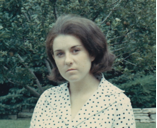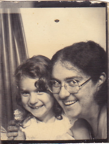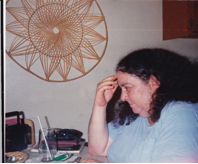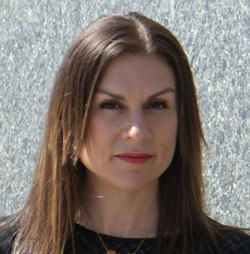
I published a blog Monday written by Kathleen Maloney about her husband, Joe, who was diagnosed with Bipolar Disorder but refused to believe he was ill and refused treatment. Had he been required to take medication, Kathleen believes his life could have been saved and her family would have been spared tremendous grief and loss. Her story received more hits on my Facebook page than anything previously posted there. It also received a high number of views on this page.
In today’s blog, we hear another touching, first-person account but from a completely different point of view. Leah Harris writes about her mother who had a severe mental illness and was forcibly medicated against her will.
A Daughter’s Call for Safety and Sanity in Mental Health
Written by Leah Harris for her mother, Gail Harris, 1950-1996
Winter 1980 – Milwaukee, WI
Mama leads me by the hand out into the cold Milwaukee night. I am four years old. We wander aimlessly through the streets. I am wearing a pink felt coat that goes down to the tops of my knees, and underneath that only a thin summer sundress. My white nylon knee socks stretch up to just below my knees, and I can feel the stinging wind against my reddening my kneecaps. Mama is mumbling to herself about Dr. Mengele again. My head feels raw and exposed. My mitten-less hand in hers soon turns into a chunk of ice.
“Who is Dr. Mengele?” I ask, and she clings tighter to my hand, mumbling something under her breath. I strain to hear her voice above the din of the passing cars, but I only see her lips moving back and forth.
Mama’s eyes are suspicious, darting this way and that. She, too, neglected to put on her knit cap before leaving the house, and the black kinky mass of her hair fans out around her face like an unruly halo.
“Nazi!” she hisses at the passersby. “Nazi doctor!” she whispers in the direction of a man in a suit who speeds up his steps to pass us.
Current day
My mother was once a bright, creative, beautiful young woman, a promising artist and a poet, who was captivated by the hippie movement. She was a creative bohemian artist, defying the conventions of our middle-class Jewish Midwestern family, which had carried a tradition of holding emotions inside and acting stoic. One day, soon after my grandparents’ divorce, she left. She hitched a ride to California, and from that point on, was never the same. The police picked her up on a park bench in Arizona, and she was committed for the first time at age 18. She rotated in and out of mental hospitals, the streets, and jail until her death.
Mama decides to let me in on the Great Nazi Conspiracy, for my own good. “Most everyone is a Nazi. A lot of Nazis are doctors. Very bad doctors. They may seem normal on the outside, but they are in on the conspiracy. We know the truth about them, and they know that we know.”
Mama tells me that she is going to protect me from them as well as she can. Protect us from them.
The main problem with the Great Nazi Conspiracy right now is that they have been poisoning the food supply. We have barely eaten anything in forever. Our stomachs have stopped growling—they’re roaring. 
Stigma is in my DNA. I grew up with extreme trauma that came from the very unstable life my mother and I struggled to lead in Inner City Milwaukee. My mother told me that she was encouraged to abort me when she became pregnant (when 25 and single), and my family has corroborated her story. My writing this is a testament that my mother fought and won against all odds. I might as easily have not been born if she was a more compliant sort of woman. My father was himself diagnosed with bipolar disorder and schizoaffective disorder, and didn’t want to be much involved. (His is a story for another time.)
This response – get rid of it – is indicative of the attitudes of the time. The blatant fear of and discrimination against people with this thing called schizophrenia. This thing called mental illness. Things haven’t changed substantially with public attitudes since 1975, when I was born, despite the money thrown at all the “anti-stigma” campaigns to date.
My mother did the best she could, and though our family tried hard to help her, she didn’t have enough community support to raise a baby on her own. She hated the disabling side effects of the Haldol and Thorazine, which made her too tired to chase around after a little one, and would often take herself off cold-turkey, resulting in withdrawal and psychotic experiences. When this happened, which was not infrequently, I bounced around between family members’ homes and foster care.
How different things would have been for us, if she had been able to get some support to keep our family together.
What if my mother’s wishes to reduce, change, or even withdraw from medication were honored and respected, instead of seen as yet another sign of her “noncompliance?”
Her psychiatrist could have worked collaboratively with her to help find a treatment plan that would have allowed her to parent. She could have gotten assistance with psychosocial rehabilitation needs. She could have been offered peer supports for parenting and life needs, skills for managing her overall health, and that of her family.
I believe these would have helped my mother to break out of the cycle of “noncompliance” and to find recovery.
When Mama starts flushing her meds, I can do whatever I want without fear of being punished. I practice to be an artist like her, since she doesn’t care at all if I draw on the walls. I scratch all over the place with pen and crayon, creating colorful worlds from my imagination. I can watch anything I want on TV, even the grown up shows with kissing and blood.
Mama has started opening all the windows, one by one, and the snow is blowing in. I am tired of playing. I wrap my frozen self in a ratty felt blanket and sit and shiver on the pink-and-red paisley sofa as the cold wind flies like knives into the apartment. Mama stands there silently by the living room window, looking out at the quickly falling snow, which blinks pink and green from Russ the Dentist’s flashing neon sign upstairs. The snow melts on the carpet by the window, creating cold damp spots that I learn to avoid with my bare feet.
My mother was under some form of court-ordered treatment for as long as I can remember. She would get picked up by a social worker at regular intervals to get a shot of Haldol or Thorazine, then would be deposited back home. That was considered humane and compassionate treatment. More often than not, she didn’t comply with the program, and so she was shipped off to Milwaukee County, taken away from her only child. When she howled in despair and fought them, completely out of control with grief, they put her into five-point restraints, over and over.
She would tell me about what it was like in the Milwaukee public mental health system, when I was older. “They are the Nazi doctors. They tried to break me, Leah,” she would say. “They tied me up and left me there for days, it seemed. I defecated myself, and they left me like that. But I told them what they wanted to hear, agreed to take the shots, and they let me out.”
Her “delusions” now make sense to me. In nearly a lifetime in and out of public systems, she received no emotional support, just medication stabilization and abusive interventions in the name of care.
These kinds of abuses still go on today in many inpatient facilities in this country.
No one ever asked my mother what she needed or wanted out of life. That wasn’t done back then. It’s rarely done now for people with serious mental illness, who are seen more often as objects of treatment, rather than collaborators in their own healthcare.
The phone is ringing more and more often now. Mama refuses to pick it up, letting it ring and ring and ring. I count the rings, and can only count to ten, so I count to ten three times.
“Don’t answer it, baby. It might be them. They might try to get secrets out of us.”
“C’mon. Please?” I just want to answer the phone. I wonder if it’s Grandpa.
The next time the phone rings, she just rips it out of the wall. I pout.
It is not much longer until we hear the loud, angry knocks on the door.
“Open up, Gail!” I hear Grandpa’s voice shout. “I’ve got the police with me.”
She swings around and looks at me, standing there frozen with the blanket in my hand. I am too scared to cry.
“Leah, let’s go,” she whispers. She leads me to the bedroom. “Hide under the bed, and don’t come out, no matter what. I won’t let them take you away from me again,” she says in a very calm voice. She gives me a tender kiss on the forehead, and I scramble under the bed, with my face peeking out, looking at her.
“Now! Hide yourself out of sight!” she scream-whispers.
The fact that police are so often the first responders to struggling families like ours, even in 2014, has always baffled me. How much more punitive does it get?
 My grandfather meant well. Of course he didn’t want to involve the police, but he didn’t have any other resources at his disposal. And he was an educated attorney. This was in 1980. But are things substantially better in our communities now? The answer is: a little bit, but not enough. I fully support efforts like Crisis Intervention Team Training (CIT), which teach police how to sensitively respond to people and families in crisis. But the recent Senate hearing I attended on this issue illustrated that the pockets of excellence are few, and the community needs are so great.
My grandfather meant well. Of course he didn’t want to involve the police, but he didn’t have any other resources at his disposal. And he was an educated attorney. This was in 1980. But are things substantially better in our communities now? The answer is: a little bit, but not enough. I fully support efforts like Crisis Intervention Team Training (CIT), which teach police how to sensitively respond to people and families in crisis. But the recent Senate hearing I attended on this issue illustrated that the pockets of excellence are few, and the community needs are so great.
I wrote testimony to be submitted for that Senate hearing, and wanted to talk to someone who was doing it right. I interviewed Commander Richard Correia, a champion of CIT within the San Francisco Police Department, and he won me over when he said this: “It’s entirely possible to handle these situations without the use of force. Creating a citywide mechanism that facilitates the response of CIT-trained offers in appropriate situations improves outcomes for both the officer and the person in crisis. It is our aspiration to one day bring down use of force to zero.”
In our case, imagine if a mobile crisis team had come to the door that included a “peer,” someone who had once had psychotic experiences and now works to help others to live in the community? What if the police at the scene had been CIT trained, and together with the peer supporter and our family had come up with some ideas as to how to de-escalate the situation? There is no need to tear families apart in this brutal way. Things could have been so different. But now, this story remains my earliest memory, one of the most traumatic memories of my life.
The pounding is becoming louder. The police are breaking down the door. And all the while my grandfather’s voice is calling on Mama to open up.
“Hide. Go to the very back, against the wall. Now.” She is bending down so her face is not far away from mine. “I love you, baby.” She gives me a kiss.
“I love you too, Mama,” I mouth, afraid to make a sound. Dressed only in my Wonder Woman underwear, my blanket forgotten on the living room floor, I crawl to the back of the bed like she says. I roll myself into a little ball. Mama’s feet disappear through the bedroom doorway. I feel the gritty dust grinding against my exposed legs. Mama has left the windows open in the bedroom, too. I do my best to hold my breath, but when my lungs are on the verge of explosion, I let my breath trickle out in a steady stream that sounds like a mighty roar in my ears.
Staying still takes all of my effort as the grit digs into my skin. If you can’t see them, they can’t see you, I think, and pretend that I am surrounded by a magical, shimmering shield of invisibility. A shield that will protect me until the pounding on the door stops and I can jump into Mama’s arms. I hear her pushing the couch against the door, and the pounding only grows faster and louder. My heart won’t explode, I tell myself over and over. I cringe as I hear the door being knocked down, chopped away from its frame, and the furniture sliding across the floor amidst Mama’s voice screaming.
After that, time seems to slow down and even stop for a while.
“Where is she? Where is Leah?” My grandfather shouts. “Goddamnit, Gail.”
“You’re not going to take her away from me again!! Get your hands offa me!”
After the courts removed me from my mother’s care, I went to live in another state with her mother, my maternal grandmother, and her second husband. My mother died figuratively the day I was taken away, and I too was traumatized by this abrupt separation. As broken as she was before this happened to our family, she was shattered beyond all recognition after. From afar, I spent the rest of my life observing her deteriorate further.
I respect the right of every person to make informed choices when it comes to their treatment, including medication, but my mother was on frighteningly high doses of multiple psychiatric drugs, and no one apprised her of the risks. This practice of “polypharmacy” is not uncommon to this day. In the late 1980s, she was one of the first patients to participate in clinical trials for Zyprexa. On high doses of this drug, her hands shook so badly that she could barely draw or write, the only things she still loved in life besides me. From the massive weight gain caused by the drugs, she ultimately developed diabetes and a host of other health problems.
As my mother deteriorated, I was going through my own full-blown psychiatric crisis, multiple suicide attempts, and inpatient hospitalizations. I started my adult life in a filthy group home, where I was told I belonged. My mother and I were lost to each other, floating in our separate seas of pain. By sheer force of will, and a lot of help from my family, I clawed my way out of my psychiatric crisis and managed to get into college. I was recovering, while she continued to be rocked by wave after wave of despair.
“Things will be much easier if you cooperate, Ma’am,” says one of the policemen.
“She’s not here. I sent her away because I knew you were coming with your Final Solution. I won’t let you take her away from me again. You’ll never take her from me again! I won’t…let you…take her!” she screams over and over, louder and louder.
I hear the sound of fists against flesh, and there is crashing all around, and more shrieks coming from Mama. And I know that I am safe because of my magic bubble that will float me away from all of this, and will float me back to Mama when all of this is over. I close my eyes and imagine myself flying out the window in my feather-light vehicle, the airborne version of Cinderella in her magical pumpkin-coach.
“Take her to County,” I hear one of the voices say.
Mama’s voice gets fainter and fainter as they drag her down the stairs. “LEAH! I LOVE YOU!” I think I hear her scream. I love you too, Mama, I say inside myself. She is fighting all of the way and then suddenly I don’t hear her voice any more.
“Damn, it’s cold in here,” says one of the officers.
“It’s ok to come out now. Grandpa’s here,” I hear Grandpa say in a cajoling tone. “C’mon sweetie.” I don’t budge. The bubble of silence surrounding me is too strong. I cannot break it even to cry out to him.
“Check under the bed,” says the other officer.
The footsteps get closer, clunking around on the floor, and then I see three pairs of big, black shoes circling the bed. Shiny shoes, great boats of shoes, topped off by the neat hems of pants cuffs. I think that I cannot hold my breath any longer. Then Grandpa’s worried, wrinkled, craggy face appears under the bed. He is looking straight at me with puffy, watery eyes, and I know that my trick has failed. My breath comes out with a soft ragged whooosh. The bubble breaks from the force of my breath and I am revealed, gritty legs and all. His long thin arm reaches under the bed, waving back and forth like a wounded snake, beckoning me to come out.
My mother had trouble breathing. She had been a heavy smoker all her life, which she told me helped with the side effects of all the meds she had been compelled to take. She now regularly had to go to the emergency room to get intubated, a procedure during which tubes were inserted into her trachea to open her airway. One night a friend was with her when her breathing became especially labored.
“You’re looking grey, Gail,” Mary said. “Should I call 9-11?”
“No – don’t call,” said my mother.
A few hours later, she died.
I consider her death to be a form of suicide. She knew the intubation was needed to keep her airway clear, and she refused. Mama’s last stand. She was only 46. I was in my dorm room on a beautiful April day in Santa Cruz, CA, when I got the call. I was 20, and that was 18 years ago. I’ve never recovered from the loss of her. Not just the physical loss of her, but I mourn the person she could have been if we had had enlightened health care and basic social acceptance. Now Grandma Gail is someone who is only known to my son in the stories I tell.
This story is why I have been a mental health advocate for the last thirteen years. My first act as an advocate was to tell my story. And I have never stopped telling it. My family’s story is not unusual. The system was broken then, and it’s still broken now. People are suffering in communities, with lack of access to support. They are let down, as my mother and I were let down, every day.
Healthcare is a controversial subject in America today. But I feel an obligation to take it on. It is my dream that we could come together, as an advocacy community, and in Congress, to make our health care the most innovative and responsive in the world; honoring the uniqueness and dignity of every person’s mind, body, and spirit; fostering health and wellness for families; helping people heal from the effects of trauma; and preventing crisis and illness. In such a system, the emphasis would be rightly put on the social determinants of health – access to safe and affordable housing, educational and vocational opportunities, a supportive community, opportunities for personal and spiritual growth, access to healthy food, and a clean environment.
As it stands now, only the middle-class and the rich receive adequate mental health care in America. The public mental health system often mistreats and criminally neglects those who are living in poverty and in need of support. This results in not only a loss of civil rights, but worse yet, it bleeds the clients of the will and self-respect it takes to take charge of their lives and to fulfill their life goals and dreams. Is this how we want to respond to those who need help and support? We are aggressively failing our most vulnerable populations. This must end.
Creating more mechanisms for forced mental health treatment is NOT the way to change things. We, as a society, can and should create more effective services and supports than coercion. If we have to force people to accept what we have to offer, should we blame their illness, or blame the quality of available health care?
Other countries, such as the UK, are looking to sharply reduce restrictive interventions in health care. These interventions are seen as outdated remnants of a sad and shameful past. There are more humane ways to reach and engage people, such as models of shared and supported decision-making or the use of psychiatric advanced directives. It’s about time we took on a similar task in the United States.
It will take the best and most creative minds of our generation to rise above the same old polarized debates that have gone on for decades on the direction of mental health reform, and to come together to insist on real change for real people in real communities. In the mental health advocacy community, we must stop demonizing each other, attacking each other in the press, and instead come to see one other as people who all care deeply about these issues. I believe that we have far more in common than we do areas of contention. And we are stronger together than divided.
Individuals and families all deserve safe and accessible, responsive networks of services and support in their communities to foster health, healing and recovery. We must collectively generate the political will to comprehensively address the social and economic disparities that contribute to poor mental health and overall health outcomes.
I look forward to collaborating with anyone who wants to work together to help make that happen. 
Leah Harris, M.A., is the director of the National Coalition for Mental Health Recovery. She can be reached at http://leahidaharris.com/contact-me/



